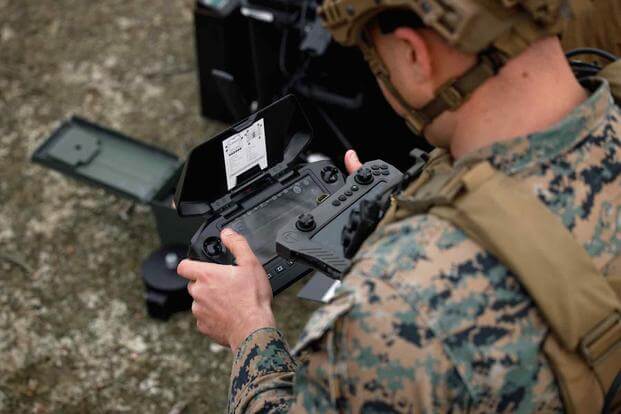The Marine Corps is expanding its unmanned aerial vehicle portfolio by fielding competitive drone teams across the fleet over the coming year, one of the service’s top officers said Wednesday.
The teams will mirror the newly unveiled Marine Corps Attack Drone Team, or MCADT, a specialized unit based out of Quantico, Virginia, that is serving as the ground-level epicenter of the service’s urgent UAV needs.
In early January, the Marine Corps stood up the all-volunteer MCADT as an answer to the world’s rapid proliferation of drones, noting it would integrate lessons learned from the ongoing war in Ukraine, compete against other services, and serve as the technical and cultural model for units across the service that will soon see their own teams pitted against each other.
Read Next: ‘This Is Going to Be a Challenge’: Service Officials Detail Fallout from Civilian Resignations Pushed by Trump
Starting next fiscal year, which begins on Oct. 1, the Marine Corps is “going to be doing an attack drone competition where we’ll field teams from across the Marine Corps to compete internal to the service,” Lt. Gen. Benjamin Watson, the commanding general of Training and Education Command, said during a media roundtable at the Modern Day Marine expo in Washington, D.C., this week.
While Watson did not say which units would participate in the competitions, the events serve as a way to help the service build its program more rapidly in the absence of actual combat, such as in Ukraine where an active adversary “forces them to evolve very quickly.”
“The closest thing we can do is put ourselves out there in competition, and so the attack drone team really is our mechanism for forcing that, putting the service’s reputation on the line with not only the other services, but a bunch of 14-year-olds with skinny arms and long hair and glasses that are probably going to kick our ass the first time we get out there in the drone competition,” Watson said.
“But we think that puts us under a level of pressure that will help us to iterate faster, particularly in the first-person-view drone space, which is one of the places we’ve got the most room to grow,” he added.
Pentagon leaders and industry professionals are sprinting toward ways to make drones scalable, cheap and replicable. But the introduction of drones to the Marine Corps has not been without its challenges, officials said throughout the expo. Military.com previously reported that leaders felt they were behind the curve on building their drone repertoire and faced some challenges, including air space management and acquiring parts.
“I think what we’re desperate to do inside the Marine Corps at this point is adopt new technologies that we’re seeing being used throughout the world, but hold on to what we value as Marines in the way that we fight,” Col. Sean Hoewing, director of the Capabilities Development Directorate’s Aviation Combat Element, said Thursday. “And so there are challenges when you introduce [a] large-scale number of aircraft that aren’t traditionally controlled by folks that are familiar with operating inside of airspace.”
But junior members of the MCADT said they have been diligently working through those problems over the last four months, such as identifying which parts “break fastest” so they can quickly reproduce them, Cpl. Hunter Zenoni, a weapons repairer on the team said, or fine-tuning motor skills to manipulate the drone’s thrust, turns and pitch. They said they share those lessons with other Marine units and services.
“It’s still a struggle,” Cpl. Timothy Brockup, an infantryman assigned to the MCADT, said about adjusting task organizations and tactical use for drones. “But it’s a struggle that we are overcoming with just more repetitions, practice and the more insight and research we put into this.”
The MCADT will take part in its first competition starting in early June against the Army’s 75th Ranger Regiment, the event likely being a model for how these newly fielded drone teams across the fleet will compete with each other.
“We’re not too terribly worried,” Brockup said, adding the MCADT has been consistently training and reviewing their tactics in preparation for facing the Rangers. Later, he added: “if you want to put it on the record, by the way — yeah, we’re gonna win.”
Related: Every Marine a Drone Operator? New Team Aims to Compete, Set Standards for Unmanned Aircraft Warfare.
Story Continues
Read the full article here


